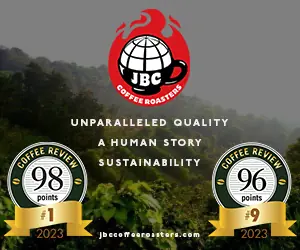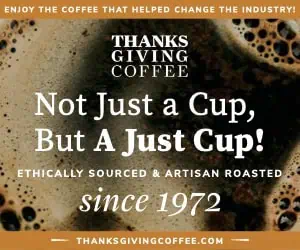Recently arrived in the mail is a certificate (suitable for framing) from the Coffee Quality Institute, the non-profit coffee research organization spun off from the better known Specialty Coffee Association of America. That I earned the certificate through some cupping in Uganda is not of much note; of late the American specialty coffee industry has been passing out certificates like cookies to kindergartners.
However, this certificate reads (at length): “In recognition of the extraordinary contribution of time, energy, and knowledge by creating a standardized formal protocol in order to discover and reward all the intrinsic flavor characteristics of Fine Robusta Coffee, freely given for the betterment of millions of small holder farmers who plant and harvest them, this certificate has been duly earned by … “ etc., etc.
The coffee insider will have no trouble spotting the flaming word of controversy here: Robusta, as in “Fine Robusta Coffees.” Awarding a certificate for contributions to a high-level symposium aimed at achieving something positive and uplifting for coffee of the Robusta species and the farmers who grow it may sound as strange to many in the specialty coffee industry as the Catholic Church proclaiming a feast day for Judas.
This is a blog, not an article, so I will not retrace in detail the history of Robusta, which has less flavor, more caffeine and more crema-producing solids than coffee from trees of the arabica species. It also has been tabooed in the American specialty coffee industry ever since that industry first raised its flag forty-plus years ago determined to free America from bad coffee.
Robusta also has been abused since its appearance on the world coffee stage. Since it was cheap to start with, the commodity trade did its best to keep it cheap by stripping it off trees and letting it dry in rotting piles wherein every taint known to coffee had an opportunity to develop: sugars fermenting to compost-pile intensity, attracting moulds that would make your old walking shoes taste sweet, all ending with a sewer-gas-like flourish. The fact that in the last twenty years some producers began to treat Robusta well, even meticulously, is a development mainly noticed in Europe, and until recently ignored completely in the U.S., where Robustas continue to be associated with rotten stuff fit only for (after some taint-muting steam-cleaning) instant and canned supermarket coffees.
But over the last decade or so producers have been producing cleaner and cleaner tasting Robusta grades, in which their nut-like neutrality, low acidity, modest spice and chocolate aromatics and fat heft can reveal themselves free of rot, ferment and mildew.
Over the past decade some U.S. specialty roasters started discreetly slipping in 10% or 12% Robustas into espresso blends to mute acidity, knit the blend together and fatten the body and crema. But the anti-Robusta taboo remains in force, as inexorable as an eleventh commandment.
True, there are those who will abuse the situation should the taboo erode. So long as Robustas remain cheaper than Arabicas, and so long as no clear distinction is made between fine Robustas and cheap, rotten ones, those slide-by roasters who have contempt for their customers will be tempted to use them to cut costs rather than fatten body. But lousy, tainted Arabicas are also subject to abuse. In my own work I find the best Robustas an invaluable ingredient in certain kinds of blends, and lately, partly owing to my experience at the Coffee Quality Institute Robusta event in Uganda, interesting possibilities for (oh my god) single-origin drip coffees as well.
Ted Lingle, the great visionary student of coffee and Director of the Coffee Quality Institute, mounted the Uganda event mainly on behalf of Robusta farmers worldwide, who largely have been left out of all of the changes and new opportunities that the fine coffee market has afforded Arabica coffee farmers over the past thirty years. Robusta farmers have little incentive to produce quality because no clear criteria for a specialty or fine quality Robusta exist. Ted and his funders at the USAID wanted to create those criteria through mounting the Uganda event. And by creating them they hope to encourage farmers who want to produce better Robustas to get the price they need to continue producing them. Ted also, like me, acknowledges that the cup character of truly fine Robustas is definitely different than the cup character of any fine arabica, but that that difference constitutes the very reason Robustas are valuable. The specialty or fine coffee industry is based on product differentiation and variety, on the excitement of exploring both quality and diversity in fine coffees. Last I checked, it was not based on limiting diversity through taboo, only through proof of quality. So the essential question is: Should a flawlessly prepared Robusta with fine Robusta character automatically be considered poor quality simply because it is a Robusta? I think not. However, I have had the opportunity to cup a good range of fine Robustas over the years from both India and Uganda, so I am aware of their intrinsic character and possibility.
I expect to take some hits over this first blog entry, and will respond to challenges that do not employ bad words about my mother or question my sanity. I also hope to report on a Robusta quality competition taking place at the East Africa Fine Coffee Association in February at which Ted Lingle and I both will be present.










